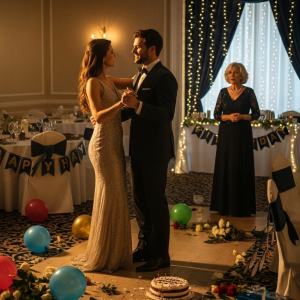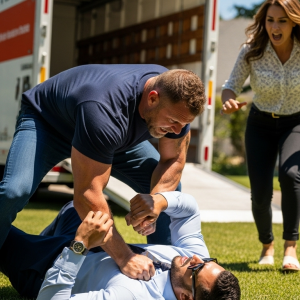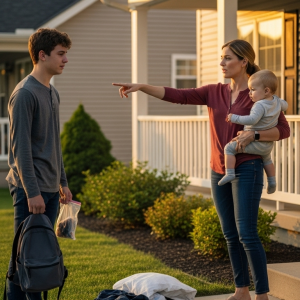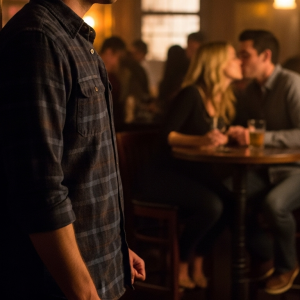The first sign that something was wrong was the laughter. It echoed across the polished tile of the resort lobby—bright, carefree, and utterly complete. My parents, my sister Kendra, and her two kids, Max and Savannah, were a perfect picture of familial bliss. They were all present, all accounted for.
Everyone but my daughter.
My husband Darius noticed it at the same time I did. He put a hand on my arm, his brow furrowed. “Where’s Rose?” he asked, his voice a low murmur against the cheerful chatter.
A knot of unease tightened in my stomach. Rose, my fierce, funny, eighteen-year-old, had been more excited about this trip than anyone. She’d spent weeks planning her outfits. Yet, since we’d all arrived at this tropical paradise for our first family vacation in years, she was nowhere to be seen.
I approached my mother, who was admiring Kendra’s new haircut. “Mom, have you seen Rose? I thought she was coming down with you guys.”
“Oh, that,” my mother said, waving a dismissive hand as if swatting a fly. Her smile didn’t falter. “There was a little issue with her passport during the layover. She’s figuring it out.” Her tone was so casual, so breezy, it made the hair on my arms stand up.
“An issue? What kind of issue?” I pressed, the knot in my stomach twisting into a sharp pang of dread. “What happened?”
“Honestly, Kendra knows the details better,” my dad chimed in, walking over. “I was just proud I found us a better deal on the flights. Two layovers, but it was so much cheaper. A real win-win!” He beamed, oblivious.
My sister Kendra sighed dramatically, as if my concern was a tremendous inconvenience. “She lost her passport,” she said flatly. “At the airport in Sudan.”
The name of the country hung in the air, cold and heavy. Sudan. A place the state department had listed as a “Do Not Travel” zone for years.
“Sudan?” Darius’s voice was sharp now, cutting through my mother’s lighthearted chatter. “The original booking was a direct flight. Why were you in Khartoum?”
“The first flight was canceled,” Dad explained with a shrug. “But the airline offered compensation! They rerouted us through London and then Khartoum. We actually got better seats and it was cheaper! We were ahead of the game.”
“You rerouted a family trip with three children through a conflict zone… to save money?” Darius asked, his voice dangerously low.
My nephew Max, Kendra’s teenage son, snorted with laughter. “You should have seen her face when she realized where we were! She totally freaked out. I wish I’d filmed it,” he added, looking to his mom for approval.
Kendra grinned, elbowing him playfully. “He’s not wrong. It was pretty hilarious. She was going on and on about how unsafe it was, like we were flying into a warzone.”
The word “hilarious” echoed in the cheerful, sunlit lobby, sounding utterly monstrous. My own voice came out as a strangled whisper. “And you left her there?”
“She’s eighteen, not a baby,” Kendra said, rolling her eyes. “She lost her own passport. Are we supposed to cancel our entire vacation because she can’t handle herself? She’s being dramatic.”
“She’s dramatic?” I repeated, the words tasting like poison. I looked from my sister’s bored expression to my father’s smug satisfaction and my mother’s unwavering, painted-on smile. They hadn’t made a mistake. This wasn’t a tragic accident. This was a choice. They had looked at my daughter, alone and terrified in one of the most dangerous places they could have taken her, and they had walked away.
I didn’t yell. A cold, terrifying calm washed over me. I looked at my husband, at the fury simmering in his eyes, and I knew we were the only adults in the room.
“You’re right,” I said, my voice quiet but laced with ice. “She’s not a baby. She’s a resourceful young woman. And you are going to regret leaving her to prove it.”
I turned my back on them, pulling Darius by the hand. As we walked toward the elevators, I could feel their confused, indignant stares on my back. They still didn’t get it. They thought this was just another family squabble. They had no idea I wasn’t just walking away from a conversation. I was walking away from them, forever.
Back in the quiet of our hotel suite, the dam broke. Not with tears, but with action. I flipped open my laptop, my fingers flying across the keys, searching for the next flight to Khartoum, contact information for the embassy, anything. The Wi-Fi was garbage. Every page took an eternity to load.
Darius was pacing the room, his phone pressed to his ear. “Yes, she’s a U.S. citizen… her name is Rose… No, we don’t have direct contact, her phone isn’t working…” His voice was a low, controlled rumble of rage.
I finally found a flight. One seat left. It departed in four hours.
“I have to go,” I said, my voice shaking. “Darius, I have to go get her.”
He stopped pacing and looked at me, his face grim. “No, we have to get her. But you’re not going there alone. Stay here. Coordinate from this end. I’ll go.” He was already pulling his wallet and passport from his bag.
“But…” I started to argue.
“Sarah,” he said, taking my face in his hands. “You know I’m right. This is not the time to argue. We need to move fast.”
He was right. I was emotional, terrified. He was calm, tactical. He booked the ticket while I tried to get through to my daughter’s phone again. Straight to voicemail. Nothing. It had been hours. My mind conjured a thousand horrifying images of her, alone, scared, a target.
Then my phone buzzed. It was a group chat message from my sister.
Kendra: Mom is having a full-blown meltdown. Dad says you’ve probably blown this all out of proportion. We looked for the passport in our bags, it’s not here. What do you want us to do?
I stared at the message, at the casual cruelty of it, at the complete lack of remorse. They weren’t sorry. They were annoyed. Annoyed that their perfect vacation was being interrupted by the consequences of their own actions.
Darius looked over my shoulder and his jaw tightened. “Don’t reply,” he said. “There’s nothing to say to them. Not now.”
He was right. I muted the chat and turned back to my laptop. In the hours that followed, we operated like a two-person command center. Darius left for the airport. I stayed on the phone with a helpful but overwhelmed embassy official, relaying information, confirming details, and fighting the rising panic that threatened to consume me.
The next morning, security was banging on their door. Not hotel security. The local authorities.
It turned out that leaving a minor—because in that country, 18 was still legally a minor—stranded and without a passport was a serious offense. My “little phone call” had set in motion a chain of events my family could have never anticipated. They weren’t just callous parents and a cruel sister anymore. They were persons of interest in an international incident.
The hotel manager’s voice was audible even through the closed door of my suite, sharp and laced with fury. I heard my mother’s voice, high and shrieking, and my father’s defensive blustering. I didn’t have to see them to know the scene: the humiliation, the shock, the dawning realization that they were no longer in control.
Later that afternoon, a text came through. It was from my sister.
Kendra: They’re holding us here. They’ve taken our passports. This is all your fault. I hope you’re happy.
I opened the chat, typed one single word, and blocked the entire group.
Yes
Two days later, Darius landed back in London with Rose. When I saw her walk through the arrivals gate, looking tired and pale but safe, I felt a part of myself I hadn’t realized was broken begin to heal. We held each other for a long time, not speaking. We didn’t need to.
The legal fallout for my family was swift and severe. They were detained, questioned, and eventually allowed to leave the country after paying a hefty fine and receiving a lifetime travel ban. The story hit the news back home. They were publicly shamed. My father’s business took a massive hit. Kendra’s perfect life unraveled.
They tried to contact me, of course. Letters, emails, messages through distant relatives. They were all variations on the same theme: a cocktail of blame, self-pity, and a baffling inability to understand what they had truly done.
I never replied.
Because the truth was, they hadn’t just abandoned my daughter in a foreign country. They had been abandoning her—and me—in small, cruel ways for her entire life. This was just the one time they got caught.
A few months later, Rose and I were looking through old photo albums. She paused on a picture from her fifth birthday. She was beaming, a piñata bat in her hands. My mom, dad, and a younger Kendra were standing behind her, all smiling for the camera.
“You know,” Rose said quietly, tracing her finger over my mother’s smiling face. “I always felt like I had to earn my spot in these pictures. Like if I wasn’t smart enough, or funny enough, I’d just disappear from the next one.”
I pulled her close, my throat tight. “You never have to earn your place with me,” I whispered. “Ever.”
That night, after she went to bed, I took that photo out of the album. I looked at their smiling, happy faces, and I didn’t feel anger anymore. I just felt a quiet, hollow pity for people who didn’t know the difference between a family and an audience.
I took out a pair of scissors, and carefully, precisely, I cut them out of the picture, leaving only my daughter, bright and joyful and free. It was a better photo now. The truth, I was learning,always is.
We didn’t go to another family vacation after that.
Not because we couldn’t. Because we wouldn’t.
The following summer, when travel influencers started posting their annual “Sun, Sand, and Sangria” montages, I booked something different. A quiet cabin in the Scottish Highlands. Just me, Darius, and Rose. No agendas. No group chats. No matching shirts and fake smiles. Just trees, sky, and the absence of expectation.
We played board games. We read books. We talked. Really talked.
And for the first time in what felt like years, Rose laughed—not the cautious laugh she gave at school when she wasn’t sure if she belonged. Not the polite chuckle she gave at her grandparents’ house when someone made a “joke” at her expense.
A real laugh. From her belly.
She was healing.
And I realized I was, too.
But healing, I’ve learned, doesn’t mean forgetting.
One day, mid-autumn, I got a letter in the mail. Handwritten. No return address, but I recognized the handwriting immediately. My mother.
I sat at the kitchen table with the envelope for twenty minutes before opening it.
Inside was a single sheet of paper:
I don’t know how to fix this.
I think about her every day. I think about you every day.
We made a mistake. We were scared. That’s not an excuse, it’s just what happened.
I want to know my granddaughter again. Even if I don’t deserve it.
There was no signature. Just blank space.
I showed it to Rose.
She read it quietly, then folded the letter in half and handed it back to me. “I don’t need them to be sorry,” she said. “I just need them to stay gone.”
And that was that.
She didn’t say it with anger. There wasn’t even a trace of spite. Just clarity. And that clarity gave me permission to stop wrestling with guilt that didn’t belong to me.
A year passed. Then two. The world moved on, and so did we.
Rose got into university—her top choice. Environmental science, with a focus on sustainability. She wants to change the world, and I believe her when she says she will.
I helped her move into the dorms. As we unpacked, I noticed a small, folded photo tucked into the corner of her desk drawer.
It was the edited picture—the one I’d cut. The one with just her, holding the bat, joy lighting up her tiny face like a sunrise.
She had framed it.
When I saw it, my breath caught.
“Is that…?” I started.
She looked over and smiled. “The real version,” she said simply. “The one where I’m enough.”
That night, I walked alone through campus before heading back to the car. Students passed me in groups, laughing, planning, growing. My daughter was one of them now. Free.
Not long after that, I got a call from an old friend. Someone who had been around during the years I tried so hard to maintain the illusion of a happy family. She’d watched me host Christmases with plastered smiles, mediate fights I didn’t start, clean up messes I didn’t make.
“I saw your sister,” she said. “At the co-op near my place. She looks… different. Smaller, somehow.”
I didn’t ask what she meant. I didn’t care.
That same week, my father sent an email.
Subject: Please.
I know we’ve made mistakes. But I’m old. And I miss my girls. Tell Rose I said hello. Tell her I think about her.
I hovered over the “Delete” button for a while. Then I typed a reply.
You had a daughter.
You had a granddaughter.
You chose to lose us. That was not a mistake. That was a decision.
I never hit send. Some things don’t need answers.
Instead, I started writing.
At first, just journal entries. Then essays. Then one day, a friend forwarded one of my posts to an editor. They offered me a column.
“Families We Build” was born.
Every week, I wrote about motherhood. About setting boundaries. About redefining family. About choosing love without sacrificing self.
The column went viral.
Letters poured in—from daughters who felt forgotten, mothers who felt invisible, people who had been cast aside by those who claimed to love them.
“I thought it was just me,” one woman wrote. “I thought I was the problem.”
Every time I read a message like that, I thought of Rose. Of that airport. Of that hotel. Of that wordless moment when she finally walked back into my arms.
I didn’t just write for myself. I wrote for her.
And slowly, we built something new.
Every holiday, we invited friends who had nowhere to go. Students. Widows. Refugees. Artists. Strays.
They sat at our table and told their stories. And in doing so, they rewrote the definition of family, one forkful at a time.
At Christmas, we made ornaments out of scrap paper and hand-carved wood. At New Year’s, we didn’t make resolutions—we made declarations.
Rose always made the same one: This year, I will be nobody’s second choice.
And every year, I made mine: This year, I will love with my eyes open.
Because love, real love, isn’t blind. It sees the ugly, the selfish, the cruel.
And still chooses truth.
The last time I saw my mother, it wasn’t planned.
I was giving a talk at a community center on “Choosing Yourself Without Guilt.” Afterward, people came up to thank me. And there she was, at the edge of the crowd.
Smaller than I remembered. Not frail, exactly, but… unfinished.
She didn’t say anything. Just held my gaze.
And I nodded. Just once. A recognition. Not an invitation.
Then I turned back to the next person in line.
Because forgiveness doesn’t always mean reunion.
And sometimes, survival looks like walking away—and never looking back.




